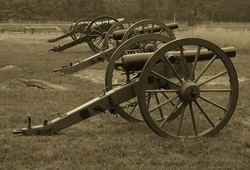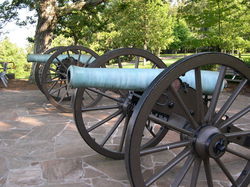Ellis Carlisle 1833-
Ellis Carlisle, CONFEDERATE
Enlisted December 10, 1861, by Col. Hamilton in Columbus, TN.
Present on December 31, 1864 muster.
Paroled at Washington, GA in April 1865.
13th (Dibrell's) TN Cavalry Regiment
Known in field and mustered throughout war as the 8th TN Cavalry Regiment

Regiment history...
Colonel Dibrell had formerly been lieutenant colonel in the twelve months' organization of the 25th Tennessee Infantry. He was soon given command of a brigade, and promoted to brigadier general July 26, 1864. Lieutenant Colonel Dougherty frequently was in command of the regiment till he was taken prisoner in 1864; from that time until March, 1865 the regiment was commanded by one or another of its Captains, usually Captain Leftwich. In March 1865, Captain Mounce L. Gore was commissioned colonel, and Lieutenant William P. Chapin major.
The regiment moved from Sparta to Murfreesboro October 8, 1862, and was placed in Brigadier General N. B. Forrest's Brigade. At Murfreesboro, the regiment was armed with 400 flintlock muskets and 600 sabres, the only issue of arms made to it by the Confederate Government; all subsequent arms were captured from the Federal forces. Its first engagement was a skirmish in Neely's Bend, near Nashville on October 15, where Private Goolsby was killed, and six or eight captured. It remained in this territory, with frequent skirmishes, until the middle of December, when it went with General Forrest on his first raid into West Tennessee, culminating in the Battle of Parker's Crossroads, December 31, 1862. On this expedition Colonel Dibrell got his first experience as a brigade commander. The regiment lost in this expedition eight killed, 35 wounded, and 130 captured or missing, most of them at Parker's Crossroads, but came out equipped with Enfield rifles.
It returned to Middle Tennessee, and on February 24, 1863 was ordered to Florence, Alabama, having an affair with Federal gunboats on March 25. When the regiment was ordered away from Florence, a public meeting was called, and resolutions adopted complimenting the regiment for its gentlemanly deportment, good discipline, and gallantry.
From Florence, it moved to Spring Hill, Tennessee, then back to Florence with the 10th Tennessee Cavalry on April 10 when Colonel Streight started the raid which ended in his capture at Rome, Georgia. On this expedition their assignment was to make such demonstrations opposite Corinth, Mississippi as to cause General Dodge, with his infantry, to draw back from the support of Colonel Streight, leaving Streight to be captured by General Forrest.
On August 31, Forrest was in command of a Cavalry Corps, Brigadier General F. C. Armstrong of the Division, and Dibrell of the brigade, which had been increased by the addition of Shaw's Battalion, Allison's Squadron, and Morton's and Freeman's Batteries. As part of this brigade, the regiment fought in the Battle of Chickamauga September 19-20, most of the time fighting dismounted.
After the battle, Forrest left the Army of Tennessee, and the regiment was placed in General Joseph Wheeler's Corps, Armstrong's Division, in a brigade composed of McKenzie's 5th, Baxter Smith's 8th, Cox's 10th, Dibrell's 8th or 13th, and Biffle's 9th or 19th Regiments, which, with the exception of McKenzie's Regiment, moved into East Tennessee with Lieutenant General James Longstreet. On November 20, it was reported in Major General W. T. Martin's Corps, Armstrong's Division, Brigadier General W. Y. C. Humes' Brigade. On December 31, McLemore's (formerly Starnes') 4th Regiment had replaced Baxter Smith's 8th and Holman's 11th Regiment had been added, with Biffle as brigade commander. It remained in East Tennessee until the last of March, 1864, having taken part in many engagements during that period, and moved through North and South Carolina to Marietta, Georgia, and then up to Resaca, Georgia. Here the division was broken up, and the brigade placed in Brigadier General J. H. Kelly's Division, of Wheeler's Corps, with Dibrell in command of the brigade, which was known henceforth as Dibrell's Brigade. The brigade members were McLemore's 4th, Cox's l0th, Dibrell's 8th or 13th, Holman's 11th and Biffle's 9th or 19th Regiments.
During the retreat of General Joseph E. Johnston's Army from Dalton to Atlanta, the cavalry covered the rear, and the regiment was almost constantly engaged. Colonel Dibrell mentions Calhoun, Cartersville, New Hope Church, Dallas, Kennesaw Mountain, Marietta, Chattahoochee River, and Peach Tree Creek.
On August 10, 1864, the regiment, reduced from 921 men when mustered into service, to 140 effectives, marched with General Joseph Wheeler on his raid into Middle Tennessee, moving first into East Tennessee, and then across the Cumberland Mountains to Sparta, where the regiment was furloughed on September 2, for a few days to rest and recruit. It gathered up stragglers from the entire command, and new recruits, which increased the force to about eleven hundred men, of whom only 300 were armed, and took up the march expecting to overtake and rejoin General Wheeler somewhere around Nashville. However, it was attacked on September 7 between Readyville and Woodbury, and was unable to break through the Federal lines. It received word from Brigadier General John S. Williams, that his command, too, had been cut off from Wheeler's forces, and would join Dibrell at Sparta. From here the joint commands turned east, and marched to Saltville, Virginia, arriving there just in time to save the salt works at that point from capture by the Federal troops under General Burbridge. This battle, on October 2, was an extremely hard fought one, lasting all day, but the Confederates won out. Dibrell reported he had with him his own regiment, six companies from McLemore's 4th Regiment, and Baxter Smith's 8th Regiment.
From Saltville, the regiment marched back to Georgia, and joined General Joseph Wheeler's Corps in opposing General Sherman on his march from Atlanta, to Savannah, Georgia, and then retreated into South Carolina. On January 31, 1865, Dibrells Brigade, Humes' Division, Wheeler's Corps, was reported as consisting of only McLemore's and Dibrell's Regiments, and Shaw's Battalion.
The regiment continued to fall back through South Carolina, being reported at White Oak, South Carolina on February 20, 1865, into North Carolina. It took part in the Battle of Averysboro, and the Battle of Bentonville, on the 18th and 19th of March. It made its last fight at Beulah, North Carolina near the Little River, on April 11, 1865. At this time, it was reported in Lieutenant General Wade Hampton's Cavalry Corps.
It marched from here to Greensboro, North Carolina, to report to President Jefferson Davis. As escort for President Davis and his cabinet, it moved to Charlotte, North Carolina, where General John C. Vaughn's Brigade from Tennessee, and some troops from Kentucky joined them. From there, they moved to Abbeville, South Carolina, where it was decided to break up the command, and allow those who wished to do so to accept the terms of General Joseph E. Johnston's surrender. They moved across the Savannah River to Washington, Georgia on the night of May 2, and were paroled there on May 11, 1865. The last muster before the parole showed 381 men present and accounted for.
After being paroled, the regiment started in a body for Tennessee and marched unmolested till it reached its native State, where, while camped on the Connesauga River, in Polk County, it was taken info custody by a squad of soldiers from Cleveland, Tennessee, marched into that place, their horses confiscated, and the members of the regiment searched for anything bearing the stamp of the United States. Deprived of their horses, which they held under the terms of the surrender, the men struck out on foot across the Cumberland Mountain and Walden's Ridge for their homes. An appeal to General Thomas at Nashville resulted in an order for the return of their horses, but by that time it was too late, and but few were recovered.
Burial...
Possibly buried in Jackson County, TN.
